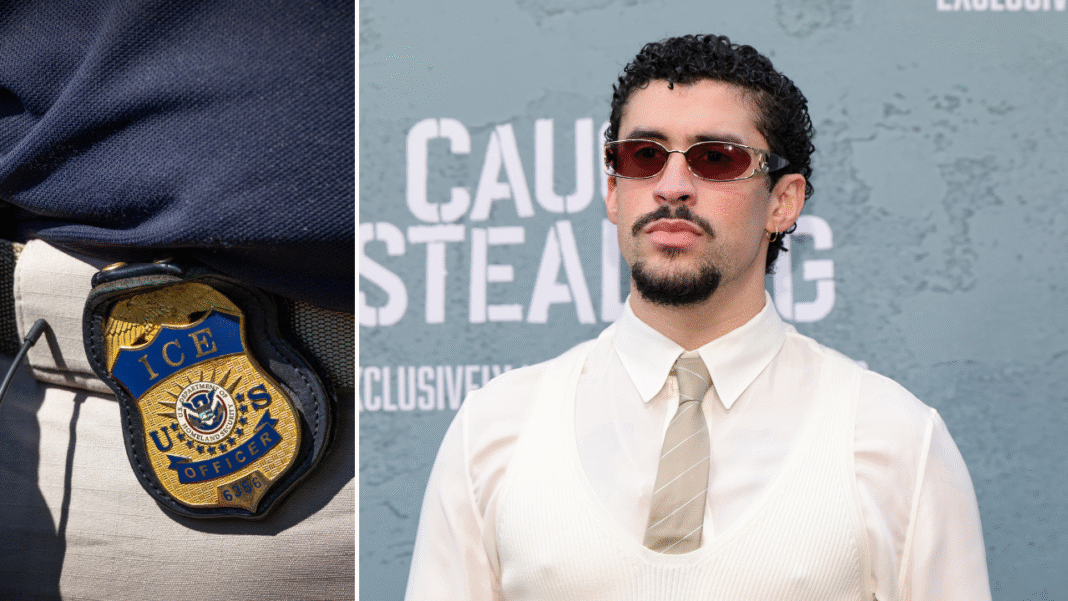ICE at the Super Bowl: A Controversy Unfolds
A Surprising Announcement
The excitement surrounding the Super Bowl is palpable, especially with the news that Puerto Rican superstar Bad Bunny will headline the halftime show at the 2026 Super Bowl in Santa Clara, California. However, this year’s festivities are coupled with an unexpected twist: Immigration and Customs Enforcement (ICE) plans to have a presence at the event. Corey Lewandowski, a notable figure from the Department of Homeland Security, made headlines with this announcement, reigniting fiery discussions about immigration policies and community safety.
A Strong Warning
“There is nowhere that you can provide safe haven to people in this country illegally. Not the Super Bowl and nowhere else,” Lewandowski declared on a recent episode of The Benny Show. His comments highlighted the administration’s unwavering stance on immigration enforcement, stating that anyone in the country without proper documentation would be at risk of apprehension and deportation. This strong rhetoric seems aimed directly at individuals in marginalized communities, raising concerns about the implications for both fans and performers at the Super Bowl.
Bad Bunny’s Pride
Bad Bunny, a three-time Grammy Award winner and a beloved figure in Latin culture, expressed profound pride at the opportunity to perform on such a significant stage. “What I’m feeling goes beyond myself. It’s for those who came before me and ran countless yards so I could come in and score a touchdown … this is for my people, my culture and our history,” he shared in a heartfelt statement. His performance promises not just entertainment but also representation of a vibrant culture at a major U.S. sporting event.
Mixed Reactions
While many celebrate Bad Bunny’s upcoming performance, conservative figures have voiced strong opposition. The announcement of ICE’s presence at the event has created an atmosphere of tension, leading activists and scholars to criticize Lewandowski’s remarks. Rosa Clemente, a noted activist, articulated that Lewandowski’s statement reflects a misunderstanding of Puerto Rican identity. “He’s not differentiating that Puerto Ricans are not immigrants, and that other people are really going to be the ones that suffer,” she stated. This point raises significant questions about the intersections of race, identity, and immigration policy.
Fear and Concern
Bad Bunny has previously spoken out about the fears surrounding ICE, particularly in light of his recent decision to limit his U.S. tour due to concerns about immigration enforcement. In an interview with i-D Magazine, he admitted, “Like, f‑‑‑ing ICE could be outside [my concerts].” The ongoing threat of ICE raids looms large over events like this, especially given the cultural and political significance of a Super Bowl halftime show.
Predictions from Activists
With the potential for heightened tensions stemming from ICE’s involvement, some worry about the implications for Bad Bunny and his performance. Clemente suggested that the presence of ICE might ultimately prompt the artist to reconsider his participation. “He doesn’t need to do it. He’s the number one artist in the world; it’s not like he needs the money,” she argued. The suggestion that he could step back from this major performance speaks volumes about the complicated interplay of art, politics, and personal safety.
A Community Response
Regardless of Bad Bunny’s decision, the mention of ICE at the Super Bowl has alarmed many, prompting discussions on safety and community protection. Activists predict a strong turnout from supporters aiming to protect those at risk, indicating that the event could become a focal point for protests rather than just a celebration of sports and music. “There’ll be thousands of people throughout California who will be going there to protect people, but to be protesting,” Clemente noted.
Misunderstanding Geography
Online discourse surrounding this topic reveals a troubling lack of understanding among certain commentators about geographic and cultural nuances, particularly regarding Puerto Rico’s status as a U.S. territory. This confusion extends beyond mere facts; it taps into deeper societal issues of race, identity, and systemic inequities. As the Super Bowl draws closer, these conversations will likely continue to unfold, revealing just how interconnected entertainment and social justice can be.
Final Thoughts
The intersection of sports, culture, and immigration policy in the context of an event as significant as the Super Bowl raises crucial questions about identity, representation, and safety. As fans look forward to an electrifying halftime show, the undercurrents of political discourse make it clear that the stakes are higher than ever for artists and communities alike. Whether ICE’s presence will have a chilling effect on the Super Bowl experience remains to be seen, but the conversation surrounding it is sure to resonate well beyond the Big Game.



